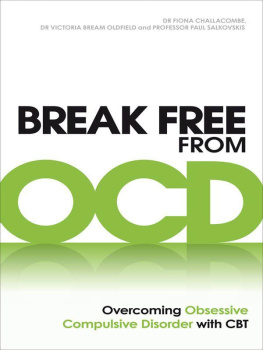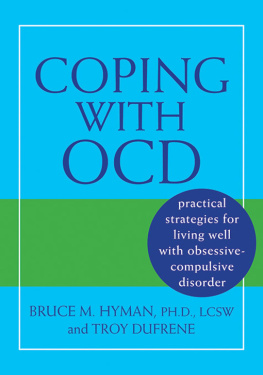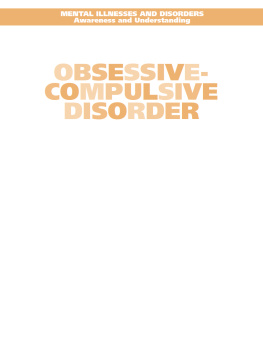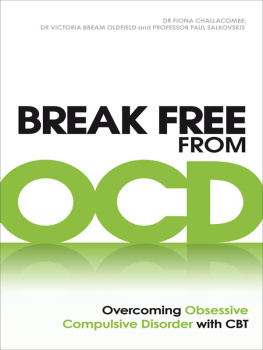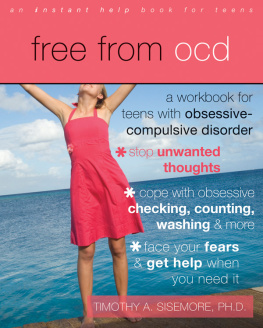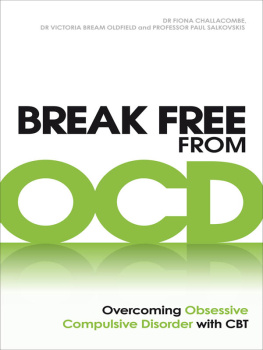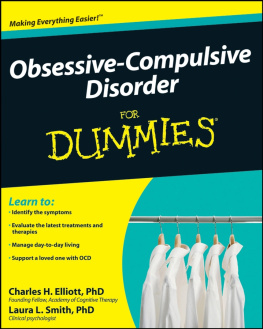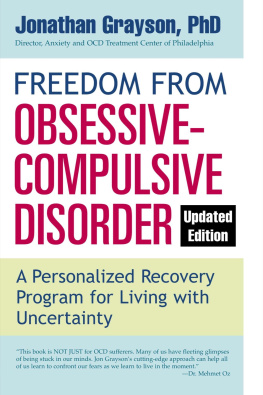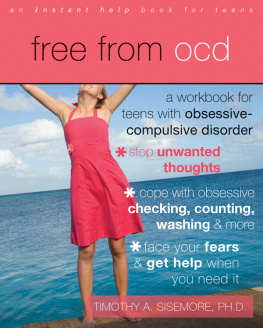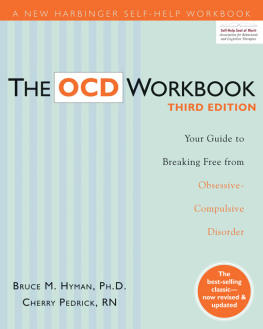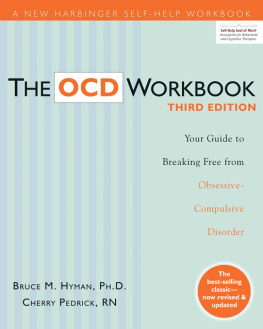CONTENTS
About the Book
Are you worried by obsessive thoughts, rituals or routines?
Would you like regain control over your behaviour and cast your fears aside?
Whether you are compelled to clean more and more thoroughly, are plagued by bad thoughts or feel the need to keep checking youve turned off appliances, obsessive worries can become a drain on daily life. However, you dont need to suffer any more. This practical guide, written by three leading cognitive behavioural therapy (CBT) experts, enables you to make sense of your symptoms, and gives a clear plan to help you conquer OCD.
Includes:
- Detailed information on the main types of OCD, including rumination OCD
- Clear, step-by-step information on treating your individual problem using CBT
- True-to-life case studies and examples
- Advice and support for friends and family of OCD sufferers
- How to keep OCD out of your life now and in the future
Whether your condition is mild or severe, this definitive resource will help you reclaim your life and keep OCD away for good.
About the Authors
Dr Fiona Challacombe MA (Cantab), DClinPsy, CPsychol, MBPS is a research fellow and clinical psychologist working at Kings College London and the Centre for Anxiety Disorders and Trauma at the Maudsley Hospital, London. She is part of a national specialist service treating individuals with severe and complex OCD. Her research focuses on the impact of OCD on parenting and families, and investigating the delivery and refinement of cognitive behaviour therapy for OCD.
Dr Victoria Bream Oldfield MA (Oxon), DClinPsy, CPsychol, MBPS is a clinical psychologist working at the Centre for Anxiety Disorders and Trauma, Maudsley Hospital, London. She is part of a national specialist service treating individuals with severe and complex OCD. She studied experimental psychology at the University of Oxford, clinical psychology at the Institute of Psychiatry, Kings College London, and trained in Cognitive Behaviour Therapy at the Oxford Cognitive Therapy Centre at the University of Oxford. Her research interests are in the phenomenology and treatment of OCD.
Professor Paul Salkovskis BSc, MPhil (Clin Psy), PhD, CPsychol, FBPS is Professor of Clinical Psychology and Applied Science and Programme Director of the forthcoming Doctorate programme in Clinical Psychology at the University of Bath. He is editor of the scientific journal Behavioural and Cognitive Psychotherapy . He has published over 250 scientific papers and recently received the Aaron T Beck award for contributions to cognitive therapy.
To Isabella, Seraphina, Cora and Duncan
HOW TO USE THIS BOOK
This book is a guide to self-help for people who already know or think they have obsessivecompulsive disorder (OCD). There are special sections aimed at friends and families who may want to read further into the book to gain knowledge of the problem and how to help (see ).
OCD can come in many forms if you have OCD we recommend reading about all the types of OCD described in this book. By gaining a really good understanding of how OCD works, you will get the best understanding of your own problems and how to beat them. We will move through thinking about the impact and the mechanics of the problem, and will use this information to help you both know how to and choose to change .
WHAT IS OBSESSIVECOMPULSIVE DISORDER?
IN THIS CHAPTER we will cover:
- The main features of obsessivecompulsive disorder
- Why it is normal to have intrusive thoughts and how it is unhelpful to try to control them
- Why obsessivecompulsive disorder becomes a problem for some people
- Introduction to the cognitive behavioural understanding of obsessivecompulsive disorder
Have you ever gone back to check that the gas is off, or thought that something is invisibly dirty or contaminated and taken extra care to clean it, or even thrown it away? Do you feel uncomfortable if your things arent arranged in a very particular way? Have you ever had a thought that you might do something terrible and out of character? Have you had a thought or mental picture about something you think you should never think about? Ever noticed what seemed like an impulse to do something you dont really want to? Or had a bad thought that you needed to cancel out in some way? These are all intrusive thoughts , meaning thoughts which pop into your head and interrupt what you are already thinking they intrude! If they intrude so often and so strongly that they severely interfere with what you want to do, then you can be said to be suffering from obsessions and compulsions as a disorder: obsessivecompulsive disorder.
OCD has been increasingly mentioned in the media over the last few years, but not always correctly. Many people will have heard about the most common forms of the problem, affecting those who compulsively wash their hands or check things repeatedly, although there are many other types. However, precisely what drives people to get stuck in these patterns of thinking and behaving is not usually talked about, leading to misunderstanding of what the problem is. As a result, OCD can be offered as an explanation for almost anything which is repeated, from preferences for routine and order to the experience of everyday worries, or the motivation behind almost any quirky behaviour which a person does more than once. Using everyday terminology, people with a strong interest are described as being obsessed with it; people who are very focused are sometimes referred to as being obsessive. Being strongly interested in something, or being perfectionistic and persistent about something important to you can be helpful in the right circumstances and may be enjoyable if these things happen by willing choice. However, truly obsessional behaviour is very different in that it is driven by personally unpleasant ideas linked to an uncomfortable or even unbearable feeling of anxiety, and stands apart from other kinds of obsessions and compulsions in being neither helpful nor enjoyable. The person suffering from OCD does not feel that they have any choice about what is happening to them. However, we will show that the processes which drive OCD are all understandable as exaggerated versions of normal psychological experiences and worries which take hold and develop into OCD in certain people.
Sometimes, when seen from the outside, the problem of OCD can seem extreme, bizarre and so far from normality as to appear mad; this is, of course, one of the factors which stops people seeing the disorder for what it is and getting the right knowledge to fight the problem effectively. Unfortunately, this can also have the effect of cutting them off from seeking help (because they feel ashamed, scared or frightened of what will happen if they tell others). If you have OCD you may think of the problem as one of mad, bad or dangerous to know, all ideas that can fill you with some combination of shame, terror and misery. OCD is none of these things, and understanding how OCD works is an intrinsic part of moving through treatment and beating the problem so you can reclaim your life. Another factor which can interfere with how a person deals with OCD is when the problem becomes so completely consuming that the person loses their perspective. In this case, all you can think about is how to make sure that the things you fear do not happen. You become so taken up with what you are trying to do by washing, checking and other rituals that you are unable to see that your problem is fear of the thing which you are focused on, rather than the thing itself.

